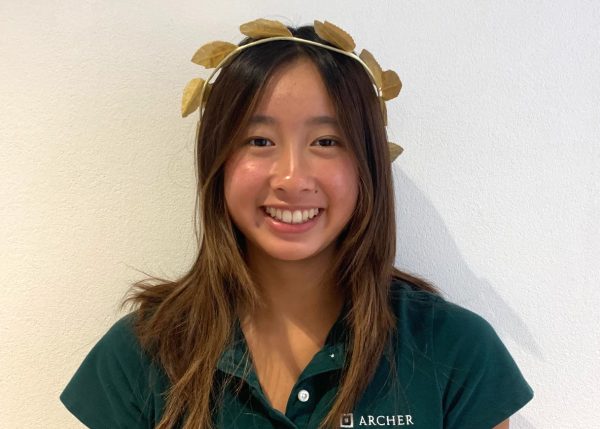Dr. Lisa Damour presents to students, faculty, parents on research on development of teenage girls, young women
Photo credit: Meredith Ho
Dr. Lisa Damour speaks to the upper school March 6 in the Zeller Student Center. Damour gave presentations to the entire student body, faculty and parents on her research specializing in the development of teenage girls and young women.
March 9, 2023
Psychologist, podcaster, “thought leader” and author of three New York Times bestsellers Dr. Lisa Damour visited Archer on Monday, but instead of delivering one presentation as most guest speakers do, she delivered five. Each presentation was tailored to the age group present and focused on her research, specializing in the development of teenage girls and young women.
“She is considered a foremost expert on young female development both spiritually, emotionally and socially,” Associate Head of School Karen Pavliscak said. “And so she knows so much, has written three New York Times bestsellers and has really helped us craft and grow [our] brand and culture to support how young women grow and thrive.”
Damour spoke to the upper school during FLX block, followed by the eighth grade at E block, sixth and seventh grade at F block and the faculty after school. That evening, Damour presented to parents at the latest Archer School for Parents event.
The first three minutes of her presentation to the upper school garnered applause, laughs, gasps and cheers from the attendees. In the minutes following, Damour asked each grade to stand and raise their hands to signal how stressed they currently are. Junior Anna Entin attended said she enjoyed the interactive parts of the presentation.
“She did a very good job speaking to the audience and making it interesting. I think a lot of speakers often — I can’t relate to them, but she made it really relatable, and I connected with a lot of the things that she said,” Entin said. “It made it less like an adult speaking down to children but more conversational.”
Damour returned to the college application process and college life multiple times throughout her speech. In one instance, she detailed her experience graduating high school as a “bad writer” — an obstacle that would take her decades to conquer.
“I want you to know, that’s what it looks like. And so, you will all go on to do incredible things, but I feel like anything you’re going to do that you feel really really good at — you’re going to get to that place of being really, really good at it probably in your 30s and 40s, and that’s going to be on the back of two decades of early career work,” Damour said. “You’re going to feel so much better as you go on knowing that it takes a long long time to get good at anything worth getting good at.”
Senior Meera Mahidhara said Damour’s presentation had special resonance for the senior class as they near the end of high school and the college process.
“It was nice because for each of the different grades, at least for high school, she was able to pinpoint what we are all feeling — we’re stressed or anxious, especially for seniors,” Mahidhara said.
At the end of her speeches to the student body, students shared with Damour information and ideas they would like to be relayed to their parents, whom she joined that evening for a discussion on her book “The Emotional Lives of Teenagers: Raising Connected, Capable, and Compassionate Adolescents.” In the past, parents were encouraged to read her other bestsellers “Untangled” and “Under Pressure.”
This was not Damour’s first time visiting Archer. In 2019, she spoke to Archer students, faculty and parents about stretching girls beyond their comfort zones and responding constructively to the inevitable stressors in their lives.
“We brought her originally to talk to the parents — maybe 2015 — and she said, ‘Can I talk to the students because the parents awareness is valuable, but help me make students understand how to cope with social challenge, how to address their emotional needs,'” Pavliscak said. “She is the one that came up with, how do you deal with conflict with your peers? How do you gain a sense of self confidence to stand up for yourself? The students really responded.”
This time at around, Damour drew from concepts in her new book, particularly how we define and talk about mental health today.
“I feel like I needed to write this book because how we are talking about mental health — prior to the pandemic, certainly through it and now — doesn’t actually square with how we understand it in psychology,” Damour said. “What my thinking is organized around and what this book is organized around is the way we’re talking about mental health that actually fits with what we know as psychologists, and I think you will find it vastly more reassuring with the idea that somewhere out there there is a good, compact place you can get to and stay there that was never on the menu.”










